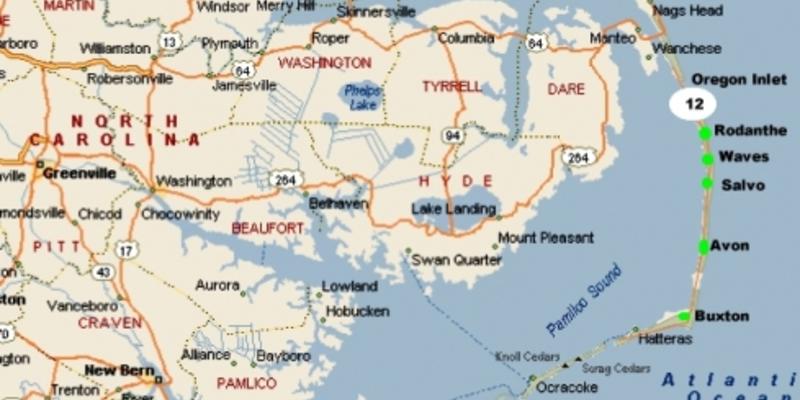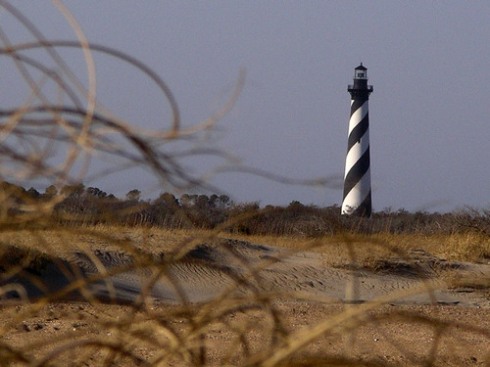
Our packed-to-the-gills minivan is finally unloaded, our week of family vacation to the Outer Banks officially over. This weekend’s finale nine-hour drive down the two-lane roads of eastern North Carolina, through has-been places like Maysville, past forgotten railroad stops in the middle of tobacco fields, was a trip down memory lane. A flashback to similar roads, even these same ones, I traveled as a child to and from the North Carolina beaches that were our annual summer pilgrimage, trips fortified by James Taylor on 8-track, Orange Crush, and Coppertone. The drive also gave me plenty of time to reflect on the wonders of being away, the memory-making value of vacation, and to think about the difference between a touristy “get-away” and travel.
This distinction was explored in a recent New York Times essay, “Reclaiming Travel,” that caught my attention as my husband and I were Expedia-ing and Travelocitying last-minute options to gather our troops before our oldest goes back to college (this week!) and the others start school. We had hopes of venturing to an eye-opening landscape, like Zion National Park—lands yet unseen by our notso globe-trotting family, but “no vacancy” deadends and exorbitant airfare re-routed us to Avon, North Carolina and the Cape Hatteras National Seashore, in search of elusive surfing swell.
Except for miles of undisturbed dunes covered in sea oats and the blissfully cooler, clearer water, it was a long haul to a terrain not terribly different from home. So what was the point? Family time beyond the bounds of our normal routine was enough for me—waiting out thunder storms over rounds of gin rummy; reading on the beach with my teenaged daughters; paddleboarding with my husband; an evening trip to the Dairy Queen. It was R&R—lovely, needed, and thoroughly enjoyed—but not real travel, I admit. In the essay, the authors ask, ”So what distinguishes meaningful, fruitful travel from mere tourism? What turns travel into a quest rather than self-serving escapism?” and they offer this answer:
Travel is a search for meaning, not only in our own lives, but also in the lives of others. The humility required for genuine travel is exactly what is missing from its opposite extreme, tourism. Modern tourism does not promise transformation but rather the possibility of leaving home and coming back without any significant change or challenge. Tourists may enjoy the visit only because it is short. The memory of it, the retelling, will always be better. Whereas travel is about the unexpected, about giving oneself over to disorientation, tourism is safe, controlled and predetermined. We take a vacation, not so much to discover a new landscape, but to find respite from our current one, an antidote to routine.
 Well, yes, especially if you cross the path of Vikki Matsis while you are here. I first met Vikki when I was coordinating a “Poetry for the Planet” program, sponsored by the Sophia Institute and the Coastal Conservation League, maybe four or five years ago. Vikki took the stage that night at the City Gallery, with a full moon over Charleston Harbor in the background, and outshone that brilliant moon. Her poetry and her delivery were mezmerizing, and I’ve been a fan ever since. In addition to being a writer and performer, Vikki is the founder of Charleston’s acclaimed NotSo Hostel, where she perfects the art of hospitality, both welcoming and inspiring travelers.
Well, yes, especially if you cross the path of Vikki Matsis while you are here. I first met Vikki when I was coordinating a “Poetry for the Planet” program, sponsored by the Sophia Institute and the Coastal Conservation League, maybe four or five years ago. Vikki took the stage that night at the City Gallery, with a full moon over Charleston Harbor in the background, and outshone that brilliant moon. Her poetry and her delivery were mezmerizing, and I’ve been a fan ever since. In addition to being a writer and performer, Vikki is the founder of Charleston’s acclaimed NotSo Hostel, where she perfects the art of hospitality, both welcoming and inspiring travelers.